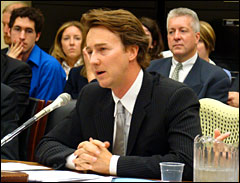 Ed Norton will go green — literally — next month when he hits the big screen as The Incredible Hulk. But on Wednesday he was on the Hill talking up the virtues of going green figuratively, in our building practices.
Ed Norton will go green — literally — next month when he hits the big screen as The Incredible Hulk. But on Wednesday he was on the Hill talking up the virtues of going green figuratively, in our building practices.

Norton appeared before the House Select Committee for Energy Independence and Global Warming, along with experts in the green-building field, to talk about why building green is better for the planet and your wallet. Norton is a trustee for the Enterprise Foundation, which works to bring green building practices to low-income housing developments.
“The fastest way to make the most progress most quickly on climate change is by reducing energy waste in buildings,” Norton told the committee. “The most cost-effective ways to do that are by retrofitting existing buildings, while the deepest energy and greenhouse-gas reductions can be made in new buildings as they come online. Major gains are achievable by applying what we know today.”
(Norton isn’t just a clueless actor, actually. In a 2005 interview with Grist, he spoke intelligently about environmental issues and his own work on green projects.)
Also at the hearing was San Francisco Mayor Gavin Newsom (D), who has been leading a crusade to have his city adopt the greenest building codes in the country. If his plans are approved by the city’s Board of Supervisors, all new projects and renovations in the city will be required to comply with the strictest Leadership in Energy and Environmental Design (LEED) standards by 2012. The city began fast-tracking permits for developers who voluntarily meet the LEED standards last year.
Buildings are responsible for 48 percent of all greenhouse-gas emissions, and it’s estimated that 76 percent of all the electricity that U.S. power plants generate each year is used to keep buildings running. Yesterday’s hearing was intended to examine the ways that efficient buildings and better building policies can both reduce energy costs and cut their contribution to global warming, and how government policies can support that transition.

